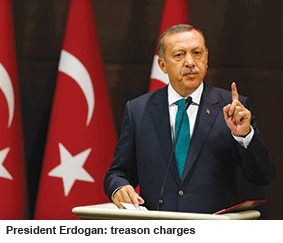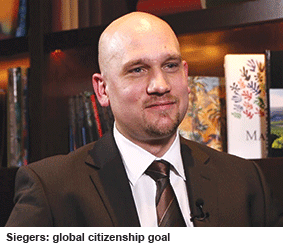 Hundreds of Turkish academics are currently waiting to see if they will be prosecuted or sacked for signing a petition calling for an end to violence in Turkey’s southeast, where government forces are fighting Kurdish separatists. On January 15, 33 scholars who signed the petition were arrested and later released.
Hundreds of Turkish academics are currently waiting to see if they will be prosecuted or sacked for signing a petition calling for an end to violence in Turkey’s southeast, where government forces are fighting Kurdish separatists. On January 15, 33 scholars who signed the petition were arrested and later released.
Turkey’s President, Recep Tayyip Erdoğan, branded the signatories “traitors” and called for universities to discipline the “so-called academics”. “Everyone who benefits from this state but is now an enemy of the state must be punished without further delay,” said Erdoğan.
Andrei Stavila was recently informed that his one-year contract at Mugla Sıtkı Koçman University, in western Turkey, would not be renewed for two more years when, following the arrests and suspension of dozens of academics, he posted a comment condemning the state of Turkish academia.
Scholars at the country’s 89 universities have been threatened with dismissal and 30 have been arrested after Erdogan denounced the “treason of so-called intellectuals” who had demanded an end to what critics see as state violence in clashes with Kurdish rebels in southeast Turkey.
Although Dr. Stavila, who is from Romania, did not sign the controversial petition, he did leave a post on a UK-based academic’s Facebook page that contained an existing post condemning the erosion of academic freedom in Turkey. In his message, Dr. Stavila criticised Turkey’s crackdown on academics as going “back to the dark ages”, saying that lecturers had faced threats for speaking out on certain issues. Within two hours of posting the message, he was contacted by his head of department and warned that his contract might not be renewed by Turkey’s higher education board, he says.
Dr. Stavila, who has now left Turkey, likens the situation in Turkish academia to that faced by Romania under the communist-era regime of dictator Nicolae Ceausescu. “I was only 12 or 13 when the Ceausescu regime fell, but my experience (in Turkey) reminded me of being told as a child not to talk about Ceausescu or I would go to prison. When I started at Mugla, I was told not to talk about contemporary politics, which is amazing as I was teaching politics and international relations.”
According to Stavila, people do talk politics, “but only behind closed doors when they are sure no one is listening. This is very like Romania in the communist period,” he says.
CEM’s transnational MBA
“I don’t want us to be the odd one out. People just don’t know about us because they cannot believe it really exists. It’s like, the bumblebee (which) shouldn’t fly, but it does.”
It takes a bold person to compare his organisation to a fragile quirk of nature. But for Roland Siegers, executive director of the Global Alliance in Management Education (CEMS), grandiose statements about redefining business education are not part of his mission. He’s an advocate of plurality. “I consider myself to be a liberal, and it’s about what’s good for (students),” he says.
CEMS is a 30-member collective of international business schools, multinational companies and non-governmental organisations that together offer a bespoke Masters in international management (MiM). The course is delivered by the academic partners with common curricular content among all member schools.
A signature part of the degree is its requirement that students spend their second term abroad at another school for “full-scale cultural and linguistic immersion”. It is the international aspect, Siegers believes, that sets CEMS apart from other models of business education courses.
The course content does not “reinvent the wheel”, he says, but the “diversity in the classroom… a hands-on, practical experience and a focus on ethical leadership and the future” offer “a pretty well-rounded experience” for students.
On one level, it appears to be successful. The CEMS MiM was placed fourth in the Financial Times’ Masters in Management 2015 ranking. One of CEMS’ main draws is an education that prepares its students to tackle what Siegers calls the “VUCA world” — volatile, uncertain, complex, ambiguous — of today. “Business schools and business education have been very utilitarian: you get the skills to get the job, to get rich. (But) the old models of ‘let’s all just become rich and happy’ just don’t work any more,” he says. “Add to that climate change, pollution — even just to be successful in business means you need to understand those challenges. The students are leading the way (saying): ‘We don’t want to be taught that old stuff that hasn’t worked. Change the stuff that you’re teaching to us,’” says Siegers.
In addition to time spent abroad, students have to do an international internship lasting at least ten weeks. It is through this heavily international programme that CEMS hopes to create graduates who promote “global citizenship”.
According to Siegers, there is a certain amount of tribalism in higher education, but the value of the knowledge economy is helping to break this down. “The thing about higher education is it’s very strictly related to law-making and the regulatory environment of every single state,” he says. “Some systems are more parochial than others. It depends on size. Sometimes the US just doesn’t seem to care about the world out there. If you’re in Switzerland or the Netherlands, you have to be international otherwise there’s no one you can compete against. I do think the (countries) that are small and have had to internationalise will have a head start and an advantage. I say this as a German, from a big country that’s lagging behind in business education.”